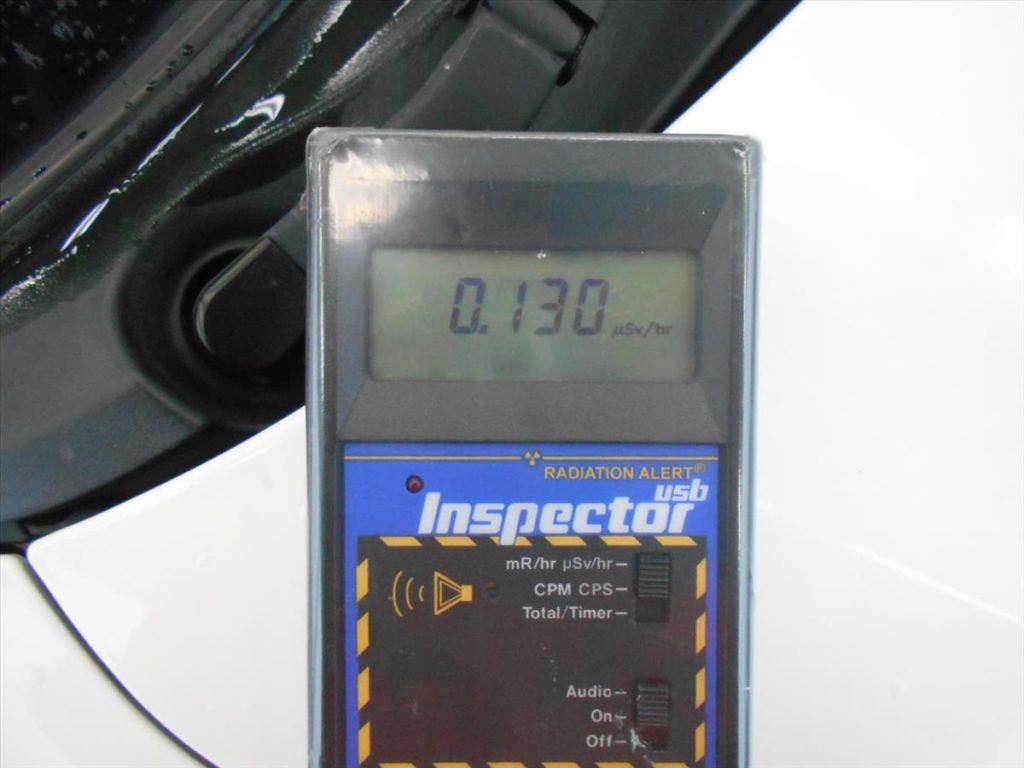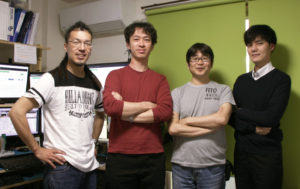Fukushima. That name has been made notorious around the world by the nuclear accident triggered by the huge earthquake off the North East coast of Japan in March 2011.
The Japanese government was concerned that the negative publicity would have a huge effect on Japanese exports just when Japan was reeling from this disaster. They were worried that the nuclear accident could harm Japan's reputation for safe products, so they implemented radiation testing for exported goods as part of the customs process.

Radiation Testing At The Port
Radiation testing also applies to used cars being exported, including the ones we source from Japanese car auctions. Several locations around the car are checked as part of the customs clearance process, and if the reading is over 0.3 micro severts per hour, the car fails and cannot leave Japan.
On the left, you can see a typical radiation testing result for a car getting ready to leave Japan. The reading shown here is well under half the maximum permitted figure at only 0.13 micro severts per hour.
Putting it in Perspective
Unfortunately, the words "radiation" or "radioactive" can trigger a real sense of fear in some people, but just how dangerous are the radiation levels found on cars from Japan? Let's put this in perspective.
First of all, remember that if the car has anything more than 0.3 micro severts per hour of radioactive emissions, it cannot leave Japan.
So, let's first check out typical background radiation present in the natural environment around the world:
London = 0.25 micro severts per hour
New York = 0.25 micro severts per hour
Tokyo = 0.057 micro severts per hour
Singapore = 0.08 micro severts per hour
So, the amount of radiation that would cause a car leaving Japan to fail the radiation test is actually not so different to the amount of naturally occurring background radiation in some famous world cities.
And get this, whenever you fly on a high-altitude airliner, you are exposed to around 5 micro severts per hour. Yes, that's well over 15 times more than the maximum allowed for cars being exported from Japan!
So,as you can see, the testing regime is very conservative and you are almost certainly at no more risk riding in your car from Japan than you would be walking around in your local neighborhood.
Should You Avoid Cars From Japan?
So should you avoid buying cars from Japanese car auctions? Well, it's pretty clear from the numbers above that cars that are exported from Japan have very low levels of radiation that are similar to or less than you would get exposed to naturally in your own country. But what if you buy a car that fails the test? What happens then?
First of all, it is now a number of years since the accident, and the chances of you buying a car that failed the test is exceptionally low.
For example, according to figures from JUMVEA, 1,326,597 used vehicles were exported in 2018. However out of these only 48 failed the radiation test --that's just under 0.0036%, or 1 vehicle in every 28,000!
To put that in perspective, that is much less likely than being hit by lightning (1 in 3000), and much more unlikely than the possibility that you will have a fatal car accident (between 1 in 500 and 1 in 600).
Plus, the risk is going down every year. The testing standards have not changed, but while there were 81 used vehicles that failed in 2017, in 2016 it was 175. In contrast, in 2013 it was 1,388, and in 2012 it was 6,544.
What if a car I buy is too radioactive to be exported?
First of all, remember that the numbers of cars that fail the radiation test has been dropping rapidly over the years. In 2018, you had about a 1 in 28,000 chance of getting one of those cars. That tiny risk has become even smaller since then.
However, let's imagine you are one of those extremely unlucky people, and you end up with a car that fails the test.
What happens then?
Well, we will simply remove the car from your account and deal with the costs of disposing of the car in Japan. If you have already sent funds to pay for that car, you will then have a positive balance that you can then use to go back to the auctions and buy another one.
To put it simply: Buying a car that fails the radiation testing will not cost you anything. We will deal with that car, and you can go get a replacement.
So is radiation something to worry about when buying cars from Japan?
Not at all. You cannot lose. You will either get cars that are well within safe radiation limits, or we will sort it out for you and it will cost you nothing.


